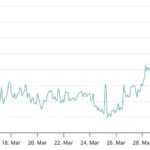In a notable intersection of technology and crime, John-Paul Thorbjornsen, a former Australian Air Force pilot turned crypto entrepreneur, is at the forefront of a discussion that mixes innovation with potential illicit activity. He has recently been championing his new cryptocurrency wallet, “Vultisig,” which is designed to be less vulnerable to hacking than its competitors. This venture rides on the back of THORChain, a blockchain Thorbjornsen co-founded, which allows users to swap cryptocurrencies without relying on intermediaries.
Recent weeks have seen a surge in activity for both Vultisig and the THORChain network, yet this uptick is entwined with a darker narrative. Security experts have linked this increase to dangerous actors, namely North Korea’s Lazarus hacking group. This notorious group, known for executing some of the largest crypto heists, was allegedly behind February’s record-breaking $1.4 billion hack of crypto exchange Bybit. Disturbingly, researchers found that around $1.2 billion—approximately 85% of the stolen funds—has traversed through the THORChain network, making it a crucial player in the laundering of crypto assets for the North Korean regime.
“The protocol keeps running and swapping despite chaos,” claimed Thorbjornsen in a recent interview, highlighting his belief in the resilience of THORChain.
A critical aspect of this situation lies in the actions—or inactions—of THORChain’s governance. Unlike other blockchain services that promptly blocked transactions tied to the Bybit hack, THORChain’s operators chose not to halt activity, leading to intense scrutiny. Critics argue this raises complex questions about the platform’s decentralization and its responsibility in curbing illegal transactions, as many wallets associated with THORChain have continued to process funds linked to the notorious hack.
As a result, THORChain’s operators and wallet developers have reportedly earned significant fees—over $12 million—through transactions connected to the heist. Legal experts warn this could put them at risk of facing serious scrutiny or sanctions under U.S. regulations regarding money laundering. The ongoing debate centers around whether THORChain can legitimately claim to be decentralized or if it operates more like a centralized service that profits from illicit activities.
Compounding the controversy is the forthcoming launch of Vultisig’s crypto token, VULT, which is set to debut on April 16. Thorbjornsen has touted the wallet’s increasing usage, with notable revenue gains; however, much of this success is shadowed by its connection to the Bybit hack. Observers like crypto investigator ZachXBT have pointed out that a significant portion of Vultisig’s revenue may be directly tied to these illicit transactions, raising further ethical questions about the wallet’s operational model.

Key Points on THORChain and Vultisig’s Role in Cybersecurity and Cryptocurrency
John-Paul Thorbjornsen, a former Australian Air Force pilot, has transitioned into the crypto sector, launching the Vultisig wallet. The following points outline key aspects of recent developments involving Vultisig and THORChain:
- Vultisig Wallet: A new crypto wallet designed by JP Thor, aimed at providing enhanced security against hacking threats.
- Foundation on THORChain: Vultisig operates on THORChain, a blockchain platform he founded to enable crypto swaps without intermediaries.
- Link to North Korean Hackers: Security experts have traced increased THORChain activity to North Korea’s Lazarus hacking group, especially after a $1.4 billion hack of Bybit.
- Decentralization Debate: The effectiveness and decentralization of THORChain are questioned, especially in relation to its handling of funds linked to illicit activities.
- Financial Implications: THORChain and its wallet services have earned over $12 million tied to transactions associated with the Bybit heist, raising concerns about legal ramifications.
- Government Scrutiny: U.S. authorities have pressed THORChain to block transactions tied to known hackers, a request the platform has largely ignored.
- Community Backlash: Actions taken by the community, like pausing transactions to address concerns related to criminal activity, were quickly rolled back, highlighting governance issues.
- Potential Security Issues: With Vultisig being linked to the laundering operations, questions arise regarding the reliability and safety of using such wallets to manage cryptocurrency.
“When the huge majority of your flows are stolen funds from North Korea for the biggest money heist in human history, it will become a national security issue.” – THORChain developer known as “TCB”
These points collectively underscore the complexities and risks associated with using decentralized cryptocurrencies, particularly for everyday users. Understanding these aspects is crucial for readers who are exploring crypto investment or usage, as ties to illegal activities can have significant legal and financial consequences.
Comparative Analysis of Vultisig and Its Position in the Crypto Wallet Market
Vultisig, the new crypto wallet from John-Paul Thorbjornsen, finds itself in a particularly contentious segment of the crypto market. Unlike more established wallets that focus on user autonomy and security, Vultisig leverages its association with the THORChain blockchain, which has recently been thrust into the spotlight due to its controversial connection with North Korea’s Lazarus hacking group. While Vultisig claims to offer enhanced security features compared to its competitors, the wallet’s legitimacy is undermined by its ties to illicit activities and the significant profits derived from questionable transactions.
Competitive Advantages: At its core, Vultisig strives to position itself as a more secure option in the crypto wallet space, which is a crucial selling point in an industry where hacks and breaches are rampant. The wallet’s design on a platform that allows crypto swaps without intermediaries presents a unique utility. Users can potentially enjoy faster and more private transactions, catering to those who prioritize confidentiality in their financial dealings. Thorbjornsen’s public persona and advocacy may also attract users looking for a recognizable figure with military credentials in a landscape that often feels anonymous and chaotic. Additionally, as Vultisig prepares to launch its crypto token, early adopters may find themselves in a favorable position to benefit from potential growth and rewards.
Competitive Disadvantages: However, the wallet’s association with THORChain, especially following devastating hacks attributed to North Korea, casts a long shadow over its credibility. The network’s refusal to freeze transactions linked to illicit activities raises significant ethical concerns, making some potential users wary of aligning their finances with a service that profits from such transactions. Furthermore, Vultisig’s operational model rests on fees generated within a highly scrutinized environment, drawing potential regulatory attention that could jeopardize its viability and user trust.
This landscape creates a dual-edged sword for users. On one hand, those deeply involved in decentralized finance may welcome Vultisig’s features and privacy benefits, enjoying a level of autonomy not typically found in regulatory-heavy options. However, individuals who are risk-averse or concerned about compliance may find themselves uncomfortable, as participation could potentially implicate them in the legal challenges facing THORChain. As regulatory bodies like the U.S. Office of Foreign Assets Control continue to clamp down on crypto operations tied to money laundering, Vultisig could become a liability for users who unwittingly engage with stolen funds.
The ongoing debate around THORChain’s operational structure also raises questions about decentralization. Critics argue that the network is not as autonomous as it purports to be, highlighting a need for potential users to carefully assess their own risk tolerance when considering engaging with Vultisig. Overall, while there are benefits to using Vultisig for certain user profiles, the broader implications tied to its operational history mean that it may not appeal to those valuing compliance and ethical considerations in their financial activities.

















